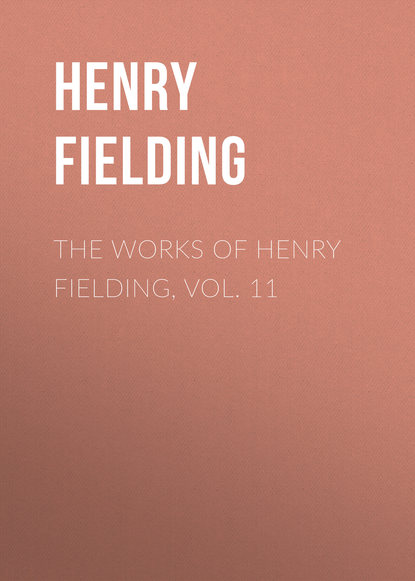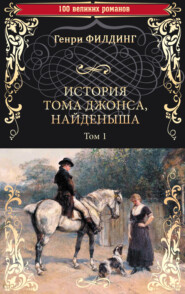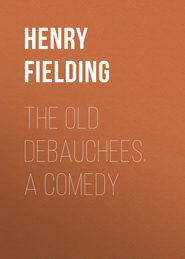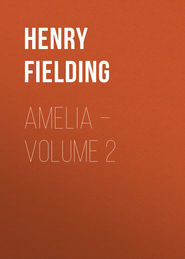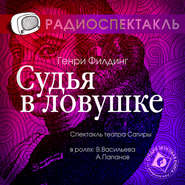По всем вопросам обращайтесь на: info@litportal.ru
(©) 2003-2024.
✖
The Works of Henry Fielding, vol. 11
Настройки чтения
Размер шрифта
Высота строк
Поля
Indeed I am convinced that, had I possessed the whole globe of earth, save one single drachma, which I had been certain never to be master of – I am convinced, I say, that single drachma would have given me more uneasiness than all the rest could afford me pleasure.
“To say the truth, between my solicitude in contriving schemes to procure money and my extreme anxiety in preserving it, I never had one moment of ease while awake nor of quiet when in my sleep. In all the characters through which I have passed, I have never undergone half the misery I suffered in this; and, indeed, Minos seemed to be of the same opinion; for while I stood trembling and shaking in expectation of my sentence he bid me go back about my business, for that nobody was to be d – n’d in more worlds than one. And, indeed, I have since learnt that the devil will not receive a miser.”
Chapter xii
What happened to Julian in the characters of a general, an heir, a carpenter, and a beau
“THE next step I took into the world was at Apollonia, in Thrace, where I was born of a beautiful Greek slave, who was the mistress of Eutyches, a great favourite of the emperor Zeno. That prince, at his restoration, gave me the command of a cohort, I being then but fifteen years of age; and a little afterwards, before I had even seen an army, preferred me, over the heads of all the old officers, to be a tribune.
“As I found an easy access to the emperor, by means of my father’s intimacy with him, he being a very good courtier – or, in other words, a most prostitute flatterer – so I soon ingratiated myself with Zeno, and so well imitated my father in flattering him, that he would never part with me from about his person. So that the first armed force I ever beheld was that with which Marcian surrounded the palace, where I was then shut up with the rest of the court.
“I was afterwards put at the head of a legion and ordered to march into Syria with Theodoric the Goth; that is, I mean my legion was so ordered; for, as to myself, I remained at court, with the name and pay of a general, without the labour or the danger.
“As nothing could be more gay, i. e., debauched, than Zeno’s court, so the ladies of gay disposition had great sway in it; particularly one, whose name was Fausta, who, though not extremely handsome, was by her wit and sprightliness very agreeable to the emperor. With her I lived in good correspondence, and we together disposed of all kinds of commissions in the army, not to those who had most merit, but who would purchase at the highest rate. My levee was now prodigiously thronged by officers who returned from the campaigns, who, though they might have been convinced by daily example how ineffectual a recommendation their services were, still continued indefatigable in attendance, and behaved to me with as much observance and respect as I should have been entitled to for making their fortunes, while I suffered them and their families to starve.
“Several poets, likewise, addressed verses to me, in which they celebrated my achievements; and what, perhaps, may seem strange to us at present, I received all this incense with most greedy vanity, without once reflecting that, as I did not deserve these compliments, they should rather put me in mind of my defects.
“My father was now dead, and I became so absolute in the emperor’s grace that one unacquainted with courts would scarce believe the servility with which all kinds of persons who entered the walls of the palace behaved towards me. A bow, a smile, a nod from me, as I past through cringing crouds, were esteemed as signal favours; but a gracious word made any one happy; and, indeed, had this real benefit attending it, that it drew on the person on whom it was bestowed a very great degree of respect from all others; for these are of current value in courts, and, like notes in trading communities, are assignable from one to the other. The smile of a court favourite immediately raises the person who receives it, and gives a value to his smile when conferred on an inferior: thus the smile is transferred from one to the other, and the great man at last is the person to discount it. For instance, a very low fellow hath a desire for a place. To whom is he to apply? Not to the great man; for to him he hath no access. He therefore applies to A, who is the creature of B, who is the tool of C, who is the flatterer of D, who is the catamite of E, who is the pimp of F, who is the bully of G, who is the buffoon of I, who is the husband of K, who is the whore of L, who is the bastard of M, who is the instrument of the great man. Thus the smile, descending regularly from the great man to A, is discounted back again, and at last paid by the great man.
“It is manifest that a court would subsist as difficultly without this kind of coin as a trading city without paper credit. Indeed, they differ in this, that their value is not quite so certain, and a favourite may protest his smile without the danger of bankruptcy.
“In the midst of all this glory the emperor died, and Anastasius was preferred to the crown. As it was yet uncertain whether I should not continue in favour, I was received as usual at my entrance into the palace to pay my respects to the new emperor; but I was no sooner rumped by him than I received the same compliment from all the rest; the whole room, like a regiment of soldiers, turning their backs to me all at once: my smile now was become of equal value with the note of a broken banker, and every one was as cautious not to receive it.
“I made as much haste as possible from the court, and shortly after from the city, retreating to the place of my nativity, where I spent the remainder of my days in a retired life in husbandry, the only amusement for which I was qualified, having neither learning nor virtue.
“When I came to the gate Minos again seemed at first doubtful, but at length dismissed me; saying though I had been guilty of many heinous crimes, in as much as I had, though a general, never been concerned in spilling human blood, I might return again to earth.
“I was now again born in Alexandria, and, by great accident, entring into the womb of my daughter-in-law, came forth my own grandson, inheriting that fortune which I had before amassed.
“Extravagance was now as notoriously my vice as avarice had been formerly; and I spent in a very short life what had cost me the labour of a very long one to rake together. Perhaps you will think my present condition was more to be envied than my former: but upon my word it was very little so; for, by possessing everything almost before I desired it, I could hardly ever say I enjoyed my wish: I scarce ever knew the delight of satisfying a craving appetite. Besides, as I never once thought, my mind was useless to me, and I was an absolute stranger to all the pleasures arising from it. Nor, indeed, did my education qualify me for any delicacy in other enjoyments; so that in the midst of plenty I loathed everything. Taste for elegance I had none; and the greatest of corporeal blisses I felt no more from than the lowest animal. In a word, as while a miser I had plenty without daring to use it, so now I had it without appetite.
“But if I was not very happy in the height of my enjoyment, so I afterwards became perfectly miserable; being soon overtaken by disease, and reduced to distress, till at length, with a broken constitution and broken heart, I ended my wretched days in a gaol: nor can I think the sentence of Minos too mild, who condemned me, after having taken a large dose of avarice, to wander three years on the banks of Cocytus, with the knowledge of having spent the fortune in the person of the grandson which I had raised in that of the grandfather.
“The place of my birth, on my return to the world, was Constantinople, where my father was a carpenter. The first thing I remember was, the triumph of Belisarius, which was, indeed, a most noble shew; but nothing pleased me so much as the figure of Gelimer, king of the African Vandals, who, being led captive on this occasion, reflecting with disdain on the mutation of his own fortune, and on the ridiculous empty pomp of the conqueror, cried out, ‘Vanity, vanity, all is mere vanity.’
“I was bred up to my father’s trade, and you may easily believe so low a sphere could produce no adventures worth your notice. However, I married a woman I liked, and who proved a very tolerable wife. My days were past in hard labour, but this procured me health, and I enjoyed a homely supper at night with my wife with more pleasure than I apprehend greater persons find at their luxurious meals. My life had scarce any variety in it, and at my death I advanced to Minos with great confidence of entering the gate: but I was unhappily obliged to discover some frauds I had been guilty of in the measure of my work when I worked by the foot, as well as my laziness when I was employed by the day. On which account, when I attempted to pass, the angry judge laid hold on me by the shoulders, and turned me back so violently, that, had I had a neck of flesh and bone, I believe he would have broke it.”
Chapter xiii
Julian passes into a fop
“MY scene of action was Rome. I was born into a noble family, and heir to a considerable fortune. On which my parents, thinking I should not want any talents, resolved very kindly and wisely to throw none away upon me. The only instructors of my youth were therefore one Saltator, who taught me several motions for my legs; and one Ficus, whose business was to shew me the cleanest way (as he called it) of cutting off a man’s head. When I was well accomplished in these sciences, I thought nothing more wanting, but what was to be furnished by the several mechanics in Rome, who dealt in dressing and adorning the pope. Being therefore well equipped with all which their art could produce, I became at the age of twenty a complete finished beau. And now during forty-five years I drest, I sang and danced, and danced and sang, I bowed and ogled, and ogled and bowed, till, in the sixty-sixth year of my age, I got cold by overheating myself with dancing, and died.
“Minos told me, as I was unworthy of Elysium, so I was too insignificant to be damned, and therefore bad me walk back again.”
Chapter xiv
Adventures in the person of a monk
“FORTUNE now placed me in the character of a younger brother of a good house, and I was in my youth sent to school; but learning was now at so low an ebb, that my master himself could hardly construe a sentence of Latin; and as for Greek, he could not read it. With very little knowledge therefore, and with altogether as little virtue, I was set apart for the church, and at the proper age commenced monk. I lived many years retired in a cell, a life very agreeable to the gloominess of my temper, which was much inclined to despise the world; that is, in other words, to envy all men of superior fortune and qualifications, and in general to hate and detest the human species. Notwithstanding which, I could, on proper occasions, submit to flatter the vilest fellow in nature, which I did one Stephen, an eunuch, a favourite of the emperor Justinian II., one of the wickedest wretches whom perhaps the world ever saw. I not only wrote a panegyric on this man, but I commended him as a pattern to all others in my sermons; by which means I so greatly ingratiated myself with him, that he introduced me to the emperor’s presence, where I prevailed so far by the same methods, that I was shortly taken from my cell, and preferred to a place at court. I was no sooner established in the favour of Justinian than I prompted him to all kind of cruelty. As I was of a sour morose temper, and hated nothing more than the symptoms of happiness appearing in any countenance, I represented all kind of diversion and amusement as the most horrid sins. I inveighed against chearfulness as levity, and encouraged nothing but gravity, or, to confess the truth to you, hypocrisy. The unhappy emperor followed my advice, and incensed the people by such repeated barbarities, that he was at last deposed by them and banished.
“I now retired again to my cell (for historians mistake in saying I was put to death), where I remained safe from the danger of the irritated mob, whom I cursed in my own heart as much as they could curse me.
“Justinian, after three years of his banishment, returned to Constantinople in disguise, and paid me a visit. I at first affected not to know him, and without the least compunction of gratitude for his former favours, intended not to receive him, till a thought immediately suggesting itself to me how I might convert him to my advantage, I pretended to recollect him; and, blaming the shortness of my memory and badness of my eyes, I sprung forward and embraced him with great affection.
“My design was to betray him to Apsimar, who, I doubted not, would generously reward such a service. I therefore very earnestly requested him to spend the whole evening with me; to which he consented. I formed an excuse for leaving him a few minutes, and ran away to the palace to acquaint Apsimar with the guest whom I had then in my cell. He presently ordered a guard to go with me and seize him; but, whether the length of my stay gave him any suspicion, or whether he changed his purpose after my departure, I know not; for at my return we found he had given us the slip; nor could we with the most diligent search discover him.
“Apsimar, being disappointed of his prey, now raged at me; at first denouncing the most dreadful vengeance if I did not produce the deposed monarch. However, by soothing his passion when at the highest, and afterwards by canting and flattery, I made a shift to escape his fury.
“When Justinian was restored I very confidently went to wish him joy of his restoration: but it seems he had unfortunately heard of my treachery, so that he at first received me coldly, and afterwards upbraided me openly with what I had done. I persevered stoutly in denying it, as I knew no evidence could be produced against me; till, finding him irreconcilable, I betook myself to reviling him in my sermons, and on every other occasion, as an enemy to the church and good men, and as an infidel, a heretic, an atheist, a heathen, and an Arian. This I did immediately on his return, and before he gave those flagrant proofs of his inhumanity which afterwards sufficiently verified all I had said.
“Luckily I died on the same day when a great number of those forces which Justinian had sent against the Thracian Bosphorus, and who had executed such unheard-of cruelties there, perished. As every one of these was cast into the bottomless pit, Minos was so tired with condemnation, that he proclaimed that all present who had not been concerned in that bloody expedition might, if they pleased, return to the other world. I took him at his word, and, presently turning about, began my journey.”
Chapter xv
Julian passes into the character of a fidler
“ROME was now the seat of my nativity. My mother was an African, a woman of no great beauty, but a favourite, I suppose from her piety, of pope Gregory II. Who was my father I know not, but I believe no very considerable man; for after the death of that pope, who was, out of his religion, a very good friend of my mother, we fell into great distress, and were at length reduced to walk the streets of Rome; nor had either of us any other support but a fiddle, on which I played with pretty tolerable skill; for, as my genius turned naturally to music, so I had been in my youth very early instructed at the expense of the good pope. This afforded us but a very poor livelihood: for, though I had often a numerous croud of hearers, few ever thought themselves obliged to contribute the smallest pittance to the poor starving wretch who had given them pleasure. Nay, some of the graver sort, after an hour’s attention to my music, have gone away shaking their heads, and crying it was a shame such vagabonds were suffered to stay in the city.
“To say the truth, I am confident the fiddle would not have kept us alive had we entirely depended on the generosity of my hearers. My mother therefore was forced to use her own industry; and while I was soothing the ears of the croud, she applied to their pockets, and that generally with such good success that we now began to enjoy a very comfortable subsistence; and indeed, had we had the least prudence or forecast, might have soon acquired enough to enable us to quit this dangerous and dishonourable way of life: but I know not what is the reason that money got with labour and safety is constantly preserved, while the produce of danger and ease is commonly spent as easily, and often as wickedly, as acquired. Thus we proportioned our expenses rather by what we had than what we wanted or even desired; and on obtaining a considerable booty we have even forced nature into the most profligate extravagance, and have been wicked without inclination.
“We carried on this method of thievery for a long time without detection: but, as Fortune generally leaves persons of extraordinary ingenuity in the lurch at last, so did she us; for my poor mother was taken in the fact, and, together with myself, as her accomplice, hurried before a magistrate.
“Luckily for us, the person who was to be our judge was the greatest lover of music in the whole city, and had often sent for me to play to him, for which, as he had given me very small rewards, perhaps his gratitude now moved him: but, whatever was his motive, he browbeat the informers against us, and treated their evidence with so little favour, that their mouths were soon stopped, and we dismissed with honour; acquitted, I should rather have said, for we were not suffered to depart till I had given the judge several tunes on the fiddle.
“We escaped the better on this occasion because the person robbed happened to be a poet; which gave the judge, who was a facetious person, many opportunities of jesting. He said poets and musicians should agree together, seeing they had married sisters; which he afterwards explained to be the sister arts. And when the piece of gold was produced he burst into a loud laugh, and said it must be the golden age, when poets had gold in their pockets, and in that age there could be no robbers. He made many more jests of the same kind, but a small taste will suffice.
“It is a common saying that men should take warning by any signal delivery; but I cannot approve the justice of it; for to me it seems that the acquittal of a guilty person should rather inspire him with confidence, and it had this effect on us: for we now laughed at the law, and despised its punishments, which we found were to be escaped even against positive evidence. We imagined the late example was rather a warning to the accuser than the criminal, and accordingly proceeded in the most impudent and flagitious manner.
“Among other robberies, one night, being admitted by the servants into the house of an opulent priest, my mother took an opportunity, whilst the servants were dancing to my tunes, to convey away a silver vessel; this she did without the least sacrilegious intention; but it seems the cup, which was a pretty large one, was dedicated to holy uses, and only borrowed by the priest on an entertainment which he made for some of his brethren. We were immediately pursued upon this robbery (the cup being taken in our possession), and carried before the same magistrate, who had before behaved to us with so much gentleness: but his countenance was now changed, for the moment the priest appeared against us, his severity was as remarkable as his candour had been before, and we were both ordered to be stript and whipt through the streets.
“This sentence was executed with great severity, the priest himself attending and encouraging the executioner, which he said he did for the good of our souls; but, though our backs were both flead, neither my mother’s torments nor my own afflicted me so much as the indignity offered to my poor fiddle, which was carried in triumph before me, and treated with a contempt by the multitude, intimating a great scorn for the science I had the honour to profess; which, as it is one of the noblest inventions of men, and as I had been always in the highest degree proud of my excellence in it, I suffered so much from the ill-treatment my fiddle received, that I would have given all my remainder of skin to have preserved it from this affront.
“My mother survived the whipping a very short time; and I was now reduced to great distress and misery, till a young Roman of considerable rank took a fancy to me, received me into his family, and conversed with me in the utmost familiarity. He had a violent attachment to music, and would learn to play on the fiddle; but, through want of genius for the science, he never made any considerable progress. However, I flattered his performance, and he grew extravagantly fond of me for so doing. Had I continued this behaviour I might possibly have reaped the greatest advantages from his kindness; but I had raised his own opinion of his musical abilities so high, that he now began to prefer his skill to mine, a presumption I could not bear. One day as we were playing in concert he was horribly out; nor was it possible, as he destroyed the harmony, to avoid telling him of it. Instead of receiving my correction, he answered it was my blunder and not his, and that I had mistaken the key. Such an affront from my own scholar was beyond human patience; I flew into a violent passion, I flung down my instrument in a rage, and swore I was not to be taught music at my age. He answered, with as much warmth, nor was he to be instructed by a stroling fiddler. The dispute ended in a challenge to play a prize before judges. This wager was determined in my favour; but the purchase was a dear one, for I lost my friend by it, who now, twitting me with all his kindness, with my former ignominious punishment, and the destitute condition from which I had been by his bounty relieved, discarded me for ever.
“While I lived with this gentleman I became known, among others, to Sabina, a lady of distinction, and who valued herself much on her taste for music. She no sooner heard of my being discarded than she took me into her house, where I was extremely well cloathed and fed. Notwithstanding which, my situation was far from agreeable; for I was obliged to submit to her constant reprehensions before company, which gave me the greater uneasiness because they were always wrong; nor am I certain that she did not by these provocations contribute to my death: for, as experience had taught me to give up my resentment to my bread, so my passions, for want of outward vent, preyed inwardly on my vitals, and perhaps occasioned the distemper of which I sickened.
“The lady, who, amidst all the faults she found, was very fond of me, nay, probably was the fonder of me the more faults she found, immediately called in the aid of three celebrated physicians. The doctors (being well fee’d) made me seven visits in three days, and two of them were at the door to visit me the eighth time, when, being acquainted that I was just dead, they shook their heads and departed.
“When I came to Minos he asked me with a smile whether I had brought my fiddle with me; and, receiving an answer in the negative, he bid me get about my business, saying it was well for me that the devil was no lover of music.”
Chapter xvi
The history of the wise man
“I NOW returned to Rome, but in a very different character. Fortune had now allotted me a serious part to act. I had even in my infancy a grave disposition, nor was I ever seen to smile, which infused an opinion into all about me that I was a child of great solidity; some foreseeing that I should be a judge, and others a bishop. At two years old my father presented me with a rattle, which I broke to pieces with great indignation. This the good parent, being extremely wise, regarded as an eminent symptom of my wisdom, and cried out in a kind of extasy, ‘Well said, boy! I warrant thou makest a great man.’
“At school I could never be persuaded to play with my mates; not that I spent my hours in learning, to which I was not in the least addicted, nor indeed had I any talents for it. However, the solemnity of my carriage won so much on my master, who was a most sagacious person, that I was his chief favourite, and my example on all occasions was recommended to the other boys, which filled them with envy, and me with pleasure; but, though they envied me, they all paid me that involuntary respect which it is the curse attending this passion to bear towards its object.





